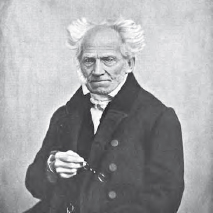Nineteenth Century PhilosophyArthur Schopenhauer |
What were Arthur Schopenhauer’s main ideas? |
Schopenhauer offered an original interpretation of Immanuel Kant’s (1724–1804) metaphysics based on additional inspiration. He wrote: “I owe what is best in my own development to the impression made by Kant’s works, the sacred writings of the Hindus, and Plato.” In his dissertation, he argued that Kant’s phenomenal world, or the world of our experience, which Schopenhauer called “the world of representation,” obeys the “principle of sufficient reason,” which he stated this way: “every possible object … stands in a necessary relation to other objects, on the one hand as determined, on the other as determining.” That is, everything is both a cause and an effect and these relations are necessary, which is to say that they cannot be denied without logical contradiction.
Kant’s noumenal world, or the “things in themselves,” of which we can know nothing except that they exist, became knowable, according to Schopenhauer, through our inner reality, which is our will. Again following Kant, because mathematics or numbers are projections of the mind that enable us to experience phenomena, Schopenhauer felt that the noumenal world has no number—it is “one.” This claim would have no consequences in experience if it were true, since it is an effort to describe what underlies experience.

